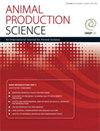The comparison of potential key genes on rat uterus and mammary gland regulated by estradiol
IF 1.2
4区 农林科学
Q2 Agricultural and Biological Sciences
引用次数: 0
Abstract
Context Although numerous studies have investigated the regulation of estrogen (E2) on the female reproductive system, there is still a lack of understanding regarding the specific genes and pathways involved in E2 regulation of the uterus and breast.Aims The aim of this study was to explore the shared genes and pathways involved in estrogen regulation of the uterus and mammary gland, which could provide a theoretical basis for disease treatment.Methods Bioinformatics analysis was employed to identify potential genes and pathways associated with E2 regulation of the uterus and breast.Key results The analysis revealed 233 differentially expressed genes (DEGs) in datasets GSE89321 and GSE95783 (adjusted-P<0.05). Additionally, five KEGG (Kyoto Encyclopedia of Genes and Genomes) pathways were identified: Glutathione Metabolism Pathway, Chagas Disease Pathway, Leishmaniasis Pathway, Complement and Coagulation Cascades Pathway, and p53 Signalling Pathway. A protein interaction network was constructed, and 10 hub genes (Alb, Il1a, Serpine1, Timp1, Ccl11, Fos, Krt19, Krt7, Lcn2, and C3) were selected, with Alb being the highest scoring hub gene. The study also predicted the association of Mo-mir-200a-5p and Mo-Mir-200a-3p with Alb and Krt19. Furthermore, 28 DEGs were identified in E2 regulation of the mammary gland, encompassing pathways such as Acute Myeloid Leukemia, ErbB Signalling Pathway, Th1 and Th2 Cell Differentiation, Th17 Cell Differentiation, and Transcriptional Misregulation in Cancer. Hub genes in the mammary gland included Pgr, Gata3, Areg, Prom1, Stat5a, Cldn4, Greb1, Tfap2c, Pdk4, and Mb. Prom1, Prom2, Fam84a, and Padi2 were found to be common DEGs in E2 regulation of both the uterus and mammary gland.Conclusions The findings of this study, together with functional annotation and pathway analysis, suggest that Alb serves as a marker protein in E2 regulation of uterus development. Additionally, Prom1, Prom2, Fam84a, and Padi2 are identified as common DEGs involved in E2 regulation of both the uterus and mammary gland.Implications This study provides comprehensive omics data to elucidate the mechanisms underlying estrogen regulation of the uterus and mammary gland, opening up new research directions for disease treatment.雌二醇调控大鼠子宫和乳腺的潜在关键基因比较
虽然已有大量研究探讨了雌激素(E2)对女性生殖系统的调控作用,但对E2调控子宫和乳房的具体基因和途径仍缺乏了解。目的探讨子宫和乳腺雌激素调节的共同基因和通路,为疾病的治疗提供理论依据。方法采用生物信息学分析方法,鉴定E2调控子宫和乳腺的潜在基因和通路。关键结果在GSE89321和GSE95783数据集中发现233个差异表达基因(DEGs) (p <0.05)。此外,还鉴定了5条KEGG(京都基因和基因组百科全书)通路:谷胱甘肽代谢通路、恰加斯病通路、利什曼病通路、补体和凝血级联通路以及p53信号通路。构建蛋白相互作用网络,筛选出10个枢纽基因(Alb、Il1a、Serpine1、Timp1、Ccl11、Fos、Krt19、Krt7、Lcn2、C3),其中Alb是得分最高的枢纽基因。该研究还预测了Mo-mir-200a-5p和Mo-Mir-200a-3p与Alb和Krt19的关联。此外,在乳腺E2调控中发现了28个DEGs,包括急性髓系白血病、ErbB信号通路、Th1和Th2细胞分化、Th17细胞分化和癌症转录失调等途径。乳腺中的枢纽基因包括Pgr、Gata3、Areg、Prom1、Stat5a、Cldn4、Greb1、Tfap2c、Pdk4和Mb。Prom1、Prom2、Fam84a和Padi2是子宫和乳腺中E2调控的共同DEGs。结论本研究结果结合功能注释和通路分析,提示Alb作为E2调控子宫发育的标记蛋白。此外,Prom1、Prom2、Fam84a和Padi2被鉴定为参与子宫和乳腺E2调节的常见deg。本研究为阐明雌激素调控子宫和乳腺的机制提供了全面的组学数据,为疾病治疗开辟了新的研究方向。
本文章由计算机程序翻译,如有差异,请以英文原文为准。
求助全文
约1分钟内获得全文
求助全文
来源期刊

Animal Production Science
Agricultural and Biological Sciences-Food Science
CiteScore
3.00
自引率
7.10%
发文量
139
审稿时长
3-8 weeks
期刊介绍:
Research papers in Animal Production Science focus on improving livestock and food production, and on the social and economic issues that influence primary producers. The journal (formerly known as Australian Journal of Experimental Agriculture) is predominantly concerned with domesticated animals (beef cattle, dairy cows, sheep, pigs, goats and poultry); however, contributions on horses and wild animals may be published where relevant.
Animal Production Science is published with the endorsement of the Commonwealth Scientific and Industrial Research Organisation (CSIRO) and the Australian Academy of Science.
 求助内容:
求助内容: 应助结果提醒方式:
应助结果提醒方式:


